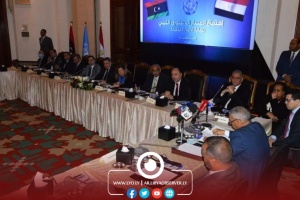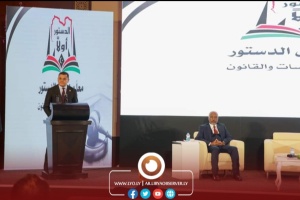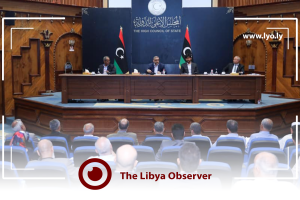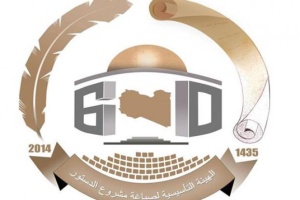This is chapter twelve of the Libyan constitution that was approved by the Constituent Assembly on July 29
Libya Constitution – Chapter Twelve

Chapter Twelve
General Provisions
Article 187: Declaration of the State of Emergency
The President, in consultation with the Prime Minister, the President of the House of Representatives, and the President the Senate, shall declare a state of emergency when the State faces a calamity, a siege, or a danger which threatens the safety of the State. The Shura Council shall hold a special session within three days from the declaration of the state of emergency, based on the request of the President of the Republic or on its own, to endorse or cancel the state of emergency in accordance with the provisions of the Constitution. If the declaration of the state of emergency occurs when the Shura Council is in recess, the Shura Council must call a session as soon as possible, within a period not exceeding seven days from the announcement of the state of emergency. The Shura Council shall be in permanent session until the President of the Republic declares the end of the state of emergency. The duration of the state of emergency must not exceed sixty days with the approval of the majority of elected members of the Shura Council. It may be renewed for a term or two, each not exceeding 60 days, with the approval of two-thirds majority of the elected members of the Shura Council. In all cases, the declaration of a state of emergency must define the objective, region, and duration of the state of emergency, in accordance with the law.
Article 188: Martial Law
The President of the Republic may, in the case of war or in the case of a severe threat to national security, request the Shura Council to declare a state of martial law. The Council shall approve the request with the absolute majority of its elected members in a period that do not exceed three days, in which the President shall announce the state of emergency in the specified region. The regions that shall be subjected to martial law must be specific; martial law] may not be imposed on the entire country. Martial law shall be lifted by a decision from the Shura Council, based upon the request of the President of the Republic, and the President shall submit monthly reports on it. The law shall regulate the provisions related to it.
Article 189: Restrictions during the State of Emergency and Martial Law
1- The law shall specify the reasons for declaring a state of emergency and martial law and their respective range, extent, and duration and the rights, which may be constrained, and the measures and procedures, which may be taken.
2- Taking into account Articles 31, 32, and 34, the President of the Republic may not impose restrictions on fundamental rights and liberties during a state of emergency or martial law, except to the extent necessary for maintaining public security and safety of the country.
3- All decisions and actions during a state of emergency or martial law shall be subject to the oversight of the judiciary.
4- The military judiciary may not consider civil proceedings during a state of emergency or martial law.
5- Elected councils may not be dissolved during a state of emergency or martial law.
6- When the declaration of a state of emergency or martial law takes place at the end of the session of any elected council, it [council] shall extend its terms until their[the state of emergency or martial law] end.
7- During a state of emergency or martial law, the State shall commit to respect the principle of lawfulness and shall not obstruct State institutions.
8- The Constitution may not be amended nor its provisions obstructed during a state of emergency or martial law. In addition, elections may not be held, the elections laws may not be amended, nor shall the established guarantees of the Shura Council be prejudiced.
Article 190: Issuing Judicial Decisions
Judicial decisions shall be issued in the name of Allah, the Most Gracious, Most Merciful.
Article 191: Prohibition against Exercising Other Functions
Members of the Shura Council, President of the Republic, Prime Minister and Ministers as well as members of local councils and constitutional bodies may not exercise any other public functions or pursue any other activity that may provide them with financial returns. Any monetary or in kind gifts received in person or through an intermediary in relation to the position or its opportunities shall become a property of the public treasury of the State.
Article 192: Prohibition against assuming sovereign functions
Those who assume sovereign functions must be Libyans, who do not hold a foreign nationality and who were not naturalized.
Article 193: Financial Disclosure
Members of the Shura Council, the President of the Republic, the Prime Minister and Ministers, members of local councils and independent constitutional shall present a financial disclosure for themselves personally, along with their spouses and minor children, within the first month after taking the oath and undertaking the duties of their positions, as regulated by the law. Disclosures shall be kept with the Constitutional Court.
Article 194: Organic Unity of the Provisions of the Constitution
The Constitution, with its preamble and provisions, shall be one indivisible unit. Its provisions shall be interpreted and considered as a coherent organic unit.
Article 195: Amendment of the Constitution and its Procedures
1- It shall be prohibited to amend the provisions of this Constitution until after five years from its entry into force.
2- It shall be prohibited to infringe upon the principle on which Article 2 of this Constitution is based, the principle upon which Article 6 is based, and the principles related to political pluralism, peaceful transfer of power, unity and integrity of national territory and guarantees related to rights and liberties, except for the purpose of enhancing them; it shall also be prohibited to increase the number of terms or duration of the Presidency of the Republic.
3- The President of the Republic or one-third of the House of Representative or one-third of the Senate may request the amendment of one or more articles in the Constitution provided that the request states the articles to be amended, the reasons, and the alternative proposals.
4- The request for amendment shall be discussed by the chamber to which it is presented, within a period that does not exceed 30 days from the date of submitting the request, and it shall be approved by the absolute majority of its elected members in accordance with the rules of procedure of each chamber. It shall then be referred to the other chamber for approval or rejection within the same date.
5- In the event that the amendment is approved, the President of the Republic shall submit it to the Constitutional Court to oversee the soundness of procedures and the permissibility of submitting a request for amendment within a period, not exceeding 15 days.
6- When the Constitutional Court acknowledges the validity of the request for amendment, it shall be put to a referendum and approved by the absolute majority of valid votes.
7- When the request is declined, it may not be submitted again during the same legislative session.
Article 196: Legislative and Institutional Building
Effective legislations shall be amended in accordance with the provisions of this Constitution. The legislative authority shall issue the necessary legislations to build institutions and independent constitutional bodies specified in this Constitution and to determining their premises during the first election cycle. The authorities and public institutions shall continue exercising their duties until authorities, established pursuant to the provisions of this Constitution, assume powers. Work continues with the current flag and anthem.
Article 197: Implementation of the Constitution
This Constitution shall enter into force after the people approve it in a referendum and after its publication in the Official Gazette. All previous constitutional documents and declarations shall be null and void.
____________________________________________
Chapter One - Chapter Two - Chapter Three - Chapter Four - Chapter Five - Chapter Six - Chapter Seven - Chapter Eight - Chapter Nine - Chapter Ten - Chapter Eleven







